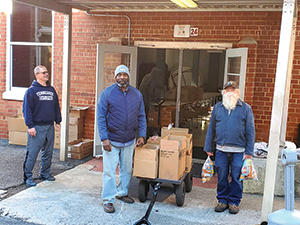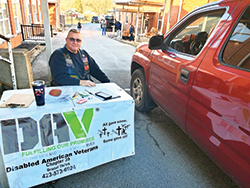
The COVID-19 pandemic and subsequent economic crisis upended lives across the country. The cost of groceries, gas, rent and other essentials has skyrocketed, putting a strain on household budgets over the last few years. According to the U.S. Bureau of Labor Statistics, the rising cost of food has outpaced all other goods by nearly 13% in the last year alone.
As prices rise, families are left to make difficult financial decisions about whether to pay rent, keep the power on or buy groceries. These households face food insecurity, which is more than just about hunger.
It means you or your family cannot buy enough food to maintain good overall health. The impact is felt locally, as food banks nationwide reported a 12% increase in food distributions in 2022.
Since 2019, DAV Chapter 39 in Bristol, Tennessee, has operated a 24/7 food pantry for veterans and their families. Last year, the food pantry moved into a larger location at Impact Community Center, a collaborative working facility. The new location proved ideal because it previously was a high school and featured a cafeteria with freezers and refrigerators, offering the ability to store fresh and cold goods.
The Chapter 39 food pantry, with the help of its members and the Auxiliary, now distributes more than 10,000 pounds of food monthly to over 80 veterans and their families.
“Besides our larger food pantry, the site has enough space for an office where our benefits advocates sit down and inform veterans and their families about additional DAV programs and services,” said Chapter Commander Michael Harman. “The Impact Community Center also has several other additional nonprofit organizations at the facility where veterans and their families can be referred to additional services as needed.”
Veterans and their families are more at risk for food insecurity than the general U.S. population. Department of Veteran Affairs and other government agency estimates vary on the number of veterans facing food insecurity, ranging anywhere from 6% to 24% based on data collected before the pandemic. Higher rates of food insecurity have been reported among certain high-risk subgroups, including veterans who served in Iraq and Afghanistan (27%), women veterans (28%), homeless and formerly homeless veterans (49%), and veterans with serious mental illness (35%).


Many Americans, including veterans, are familiar with the Supplemental Nutrition Assistance Program (SNAP). According to the VA, nearly 1.4 million veterans live in households that participate in SNAP, but nearly 6 out of 10 eligible veterans are not enrolled in the program.
Reports from the Food Research & Action Center show that participation in SNAP reduces food insecurity by up to 17%, improves health outcomes and lowers health care utilization. The center found that veteran families utilizing these benefits experienced positive effects not only on food expenditures but also on housing, entertainment and education expenditures.
In March 2022, the Veterans Health Administration Food Security Office started to fight back the growing issue of food insecurity. In an effort to intervene, the VA created screening guides and put clinical reminders in electronic health records to help providers identify veterans who are food insecure or at risk of food insecurity.
For nearly two decades, organizers with DAV Chapter 32 in Murphytown, West Virginia, have hosted three annual food drives to restock their food pantry.
“Food insecurity is a significant issue in our area, and the need has only grown these last couple of years,” Chapter Commander Paul Deberry said.
The food pantry serves more than 30 veterans every month, providing a vital lifeline for them and their families.
“We are grateful for the support we have received from our community to ensure our pantry remains stocked,” Deberry added.
“Food insecurity has been a significant issue facing our families, and rising prices make matters even worse,” said National Adjutant Marc Burgess. “It’s encouraging to see the VA and Department of Agriculture step up and work to address this growing need. However, I could not be more proud of the wonderful and impactful work that our members do daily to help those who served and their dependents. Thanks to their sustained efforts, countless veterans are getting the sustenance they need.”





